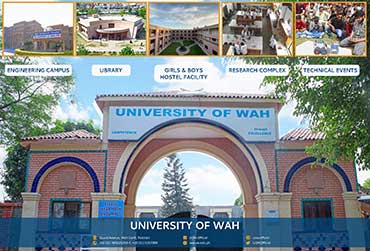| FIRST SEMESTER |
|
SECOND SEMESTER |
| Code |
Course Title |
CH |
|
Code |
Course Title |
CH |
| GE-153 |
Calculus and Analytical Geometry |
3 |
|
GE-154 |
Linear Algebra and Ordinary Differential Equations |
3 |
| ME-104 |
Engineering Statics |
2 |
|
ME-111L |
Engineering Drawing & Graphics Lab |
1 |
| GE-128 |
Applied Physics |
2 |
|
CS-110 |
Computer Programming |
2 |
| GE-128L |
Applied Physics Lab |
1 |
|
CS-110L |
Computer Programming Lab |
1 |
| GE-161/GE-163 |
Islamic Studies/ Ethics * |
2 |
|
EE-102 |
Electric Circuits Analysis |
2 |
| GE-143 |
Functional English |
3 |
|
EE-102L |
Electric Circuits Analysis Lab |
1 |
| MGT-401 |
Occupational Health and Safety |
1 |
|
GE-14x |
Arts and Humanities Elective* |
2 |
| GE-181 |
Applications of ICT |
2 |
|
GE-171 |
Ideology and Constitution of Pakistan |
2 |
| GE-181L |
Applications of ICT Lab |
1 |
|
ME-121L |
Workshop Practice Lab |
1 |
| |
TOTAL (Theory + Lab) |
17 (15+2) |
|
|
TOTAL (Theory + Lab) |
16 (12+4) |
| THIRD SEMESTER |
|
FOURTH SEMESTER |
| Code |
Course Title |
CH |
|
Code |
Course Title |
CH |
| GE-155 |
Complex Variables and Transforms |
3 |
|
EE-214 |
Electronic Circuits Design |
3 |
| EE-104 |
Electronics Devices and Circuits |
3 |
|
EE-214L |
Electronic Circuits Design Lab |
1 |
| EE-104L |
Electronics Devices and Circuits Lab |
1 |
|
ME-217 |
Mechanics of Materials |
2 |
| ME-205 |
Engineering Dynamics |
3 |
|
ME-217L |
Mechanics of Materials Lab |
1 |
| ME-216 |
Materials and Manufacturing Processes |
3 |
|
EE-202 |
Digital Logic Design |
2 |
| MTE-201 |
Data Structures and Object-Oriented Programming |
2 |
|
EE-202L |
Digital Logic Design Lab |
1 |
| MTE-201L |
Data Structures and Object-Oriented Programming Lab |
2 |
|
ME-234 |
Fluid Mechanics |
2 |
| |
TOTAL (Theory + Lab) |
16 (14+2) |
|
ME-234L |
Fluid Mechanics Lab |
1 |
| |
|
|
|
ME-224 |
Theory of Machines |
2 |
| |
|
|
|
|
TOTAL (Theory + Lab) |
15 (11+4) |
| FIFTH SEMESTER |
|
SIXTH SEMESTER |
| Code |
Course Title |
CH |
|
Code |
Course Title |
CH |
| GE-132 |
Civics and Community Engagement |
2 |
|
MTE-342 |
Mechatronics Systems Design |
2 |
| MTE-331 |
Microcontroller and Embedded Systems |
2 |
|
MTE-342L |
Mechatronics Systems Design Lab |
1 |
| MTE-331L |
Microcontroller and Embedded Systems
Lab |
2 |
|
MTE-311 |
Modelling and Simulation |
2 |
| GE-156 |
Numerical Analysis |
2 |
|
MTE-311L |
Modelling and Simulation Lab |
1 |
| GE-156L |
Numerical Analysis Lab |
1 |
|
MTE-3XX |
Technical Elective I*** |
3 |
| GE-144 |
Expository Writing |
3 |
|
MTE-221 |
Actuating Systems |
2 |
| MTE-322 |
Instrumentation and Measurement |
3 |
|
MTE-221L |
Actuating Systems Lab |
1 |
| MTE-322L |
Instrumentation and Measurement Lab |
1 |
|
GE-157 |
Probability and Statistics |
2 |
| |
TOTAL (Theory + Lab) |
16 (12+4) |
|
ME-324 |
Design of Machine Elements |
3 |
| |
|
|
|
|
TOTAL (Theory + Lab) |
17 (14+3) |
| |
|
|
|
|
|
|
| SEVENTH SEMESTER |
|
EIGHTH SEMESTER |
| Code |
Course Title |
CH |
|
Code |
Course Title |
CH |
| MTE-423 |
Robotics |
3 |
|
MTE-4XX |
Technical Elective III*** |
3 |
| MTE-423L |
Robotics Lab |
1 |
|
MTE-424 |
Industrial Automation |
2 |
| GE-1xy |
Social Sciences Elective** |
2 |
|
MTE-424L |
Industrial Automation Lab |
1 |
| MTE-4XX |
Technical Elective II*** |
3 |
|
ME-434 |
Fundamental of Thermal Sciences |
2 |
| MTE-401 |
Artificial Intelligence |
1 |
|
MTE-499 |
FYDP (Part-II) |
4 |
| MTE-401L |
Artificial Intelligence Lab |
1 |
|
GE-191 |
Entrepreneurship |
2 |
| MTE-497 |
FYDP (Part-I) |
2 |
|
GE-192 |
Project Management |
2 |
| MTE-312 |
Control Systems |
3 |
|
|
TOTAL (Theory + Lab) |
16 (11+5) |
| MTE-312L |
Control Systems Lab |
1 |
|
|
|
|
| |
TOTAL (Theory + Lab) |
17 (12+5) |
|
|
|
|









